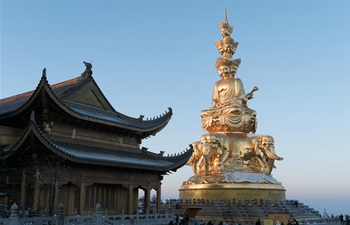ATHENS, Dec. 23 (Xinhua) -- The European Commission in Greece conveyed best wishes for happy holidays to Greek citizens this week by handing pomegranates to passers-by at a major metro station in the heart of Athens.
"The European Commission decided to give pomegranates to passers-by, to Greek citizens passing from here, in a symbolic gesture so that on one hand we wish in this way the best for the coming year 2018, and convey our message for a happy new year," Clementini Diakomanoli, head of the Representation, told Xinhua.
Pomegranate is indispensable in celebrating the new year in Greece. As an ancient symbol of fertility, good luck, prosperity, abundance and regeneration, it still holds a special place in nowadays Greek households in important events from weddings, funerals to the welcome of the New Year.
On New Year's Eve, when the clock strikes midnight, a pomegranate is smashed at the entrance of the house. Greeks believe that he more seeds scattered on the floor, the luckier the New Year will be.
The pomegranates distributed by the European Commission in Greece are the products of Greek company Alpheios Rodi SA.
Founded five years ago by 250 families at the outskirts of the city of Pyrgos in western Greece, the company completed a fully-automated production line for pure natural pomegranate juice in 2015 thanks to an over 223,000 euros European funding.
Now, its products have reached the shelves of supermarkets across Greece and many European cities.
"We wanted to show how Europe embraces the agricultural food sector in Greece which is very important for the economy and that there are funding opportunities, like the one this specific company seized," said the head of European Commission Representation in Athens.
Paraskevas Paraskevopoulos, president of Alpheios Rodi, stressed the importance of the Commission's helping hand.
"We do not rely on bank loans, but our own resources and I must say this and underline it that 25 percent of the costs were covered with EU funds. This European funding helped our company enormously in a crucial moment," he told Xinhua.
Most of the producers and shareholders who joined the initiative turned to the land seeking ways to cope with the debt crisis, he explained.
"Farming is not the main profession for more than 170 families out of the total 250 households involved. I am an economist and development advisor. There are academics, doctors, private sector employees, jobless, and journalists taking part, representatives of the middle class," Paraskevopoulos noted.
"You know the crisis in Greece did not bring only hardships, but mobilized people towards a different direction," said the former economist but today's entrepreneur.
The pomegranate undoubtedly brought good luck and regeneration to the families involved in the project.
The 60 percent of the production from the 60,000 pomegranate trees are processed and marketed as juice.
And the capacity has been increasing. At the beginning, the juice unit produced only about 16,300 bottles a year. But now, 2.3 million 250 ml bottles are produced every year with about three tons of raw material being processed each hour.
The company is ready to launch new products next year, from pomegranate marmalades to pomegranate-flavored vinegar, and considers new international collaborations. (1 euro=1.18 US dollars)

















